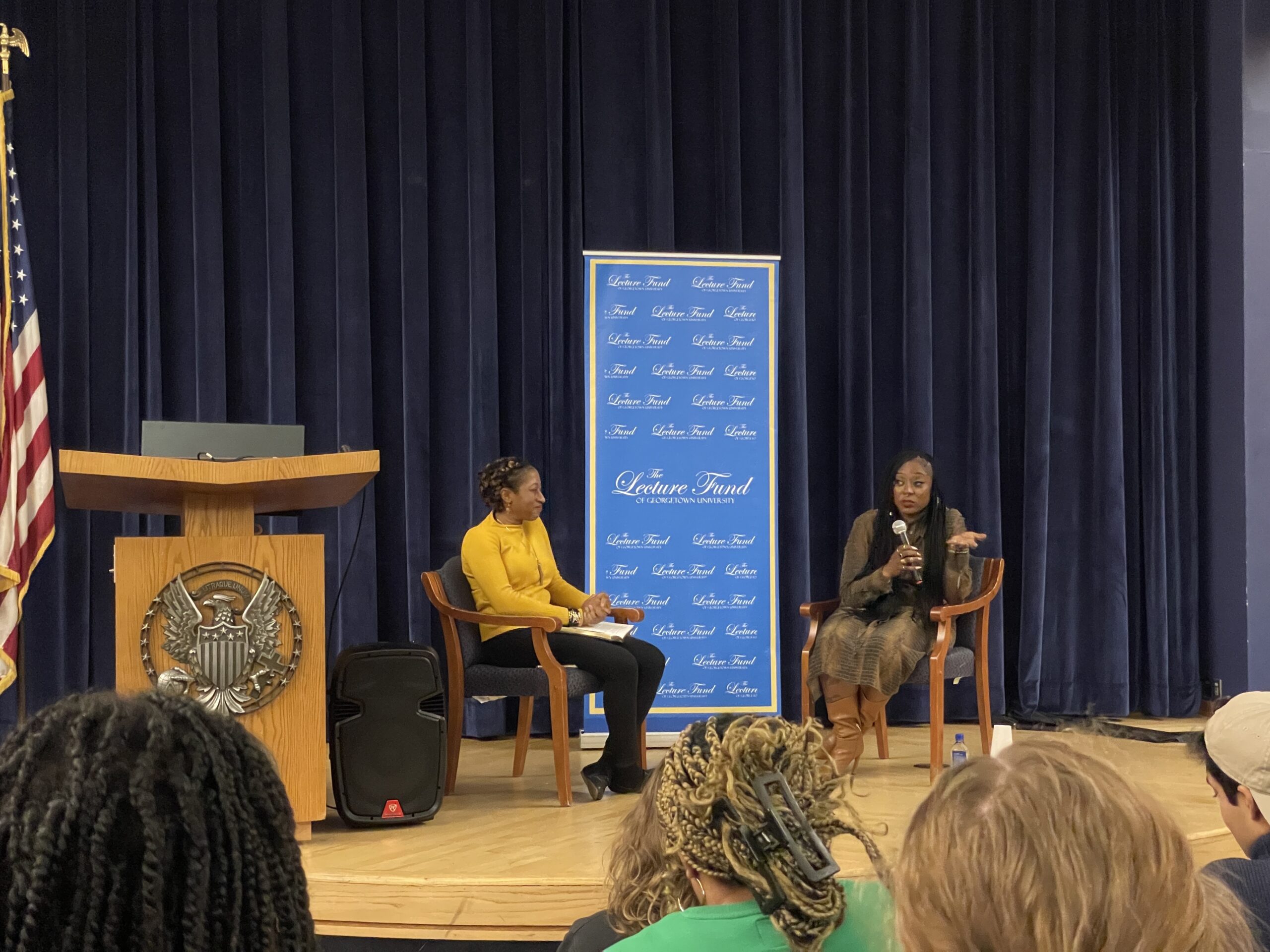One of the co-founders of the Black Lives Matter (BLM) movement, Alicia Garza, spoke to Georgetown students on Nov. 2 in an event titled “The Frontiers of Community Organizing.” Garza discussed victories in the fight for racial justice following the beginning of the BLM movement, the importance of hope, and how to remain joyful going forward.
The talk—hosted by the Lecture Fund, in conjunction with the Justice and Peace Studies, African Studies, and Culture and Politics programs, as well as the African American Studies Department—began with a reflection on the impact of the racial justice movement over the past ten years.
“We have had a full-throated conversation in this country, an interrogation, through laws and culture and practice, about racism,” Garza said. “And one thing that we know about the history of this nation, right, is that it never wanted to have that conversation.”
Garza invited audience members to imagine the world through the perspective of their parents and grandparents’ generations. The BLM movement created massive cultural shifts and prompted conversations on racism which previous generations would have struggled to fathom, she explained.
“My mother never thought that we would be having an international dialogue about state violence, police violence, police brutality,” Garza said. “In my mom’s time, they didn’t even call it that, right? They called it ‘police policing.’”
Without BLM, Garza believes the police murders of unarmed Black men, like George Floyd and Tyree Nickels, would have quickly entered and left the public consciousness. She said that people likely would have moved on, or simply believed the official story.
Beyond creating conversations about injustices within the legal system, BLM brought attention to racism in housing, education, social services, the economy, and other fundamental systems, Garza said.
But the movement wasn’t just about shifting national and international conversations. One of their most important accomplishments, Garza said, was supporting community organizers in places where they never previously existed. BLM connected people across the country, and globe, empowering them to collaborate on ways to address racism in their communities.
“There’s so many places that have BLM chapters, or have started organizing under the banner,” Garza said. “And what that means is that we have more people fighting for justice. That’s a huge deal.”
When Garza first started organizing she felt as if she could only trust the American people—not the structures, systems, and government officials. She feels the same way today, but she also sees a necessity in working within the system, until it can be changed. Looking forward, she pointed to the importance of fighting to protect American democracy.
Garza said that change will only come from both internal—voting—and external pressure on the government. She realized in 2016 that activism that did not involve internal pressure, like showing up to the voting booth, only meant that their voices were even less represented in the current system.
“If I sit out, it’s going to happen without me,” Garza said. “If I let my homies sit out, it’s going to happen without us. And we are the most important part of this conversation. They actively want us to not participate. And how do we know that? Voter suppression laws, voter ID laws.”
She made it clear she wasn’t there to pressure anyone into voting. Garza said most of the things BLM fights for can’t be addressed through simply voting, like racist sentiments and police bias. However, she urged the audience to consider the power they hold in choosing who makes decisions.
“We actually get to make a mark on history that people will remember for the rest of the time if we want to,” Garza said. “So, am I concerned about what our leaders are doing? One hundred percent and let’s stick to it. For now, we can still decide who those people are, that are making those decisions.”
The work of fighting racial injustice can be intensely difficult—there is no joy in murder, poverty, and racism. And there are moments in Garza’s organizing where she has only felt pain.
“Sometimes stuff is just hard,” Garza said. “Being with a mother after she’s lost her child is hard. Being with a mother after her child was murdered is awful. You will never unhear the scream of a mother who’s had her child murdered—you will never unhear it. There’s nothing joyful in that and you’re not gonna find it.”
Despite adversity, Garza encouraged the audience to take care of themselves and not lose sight of hope and joy in the face of suffering, even if that joy is simply a T.V. show, an ice cream sandwich, or a sprinkler on a hot day.
Garza said that only engaging in sadness can make organizers hopeless or numb to the world. There can—and should—be joy in “the practice of transforming our world,” she said.
“If I was to offer anything, it would be to say the movement should be joyful,” Garza said. “That doesn’t mean everything is supposed to feel good all the time…We have joy in our lives at the same time that there are really ugly things happening.”





